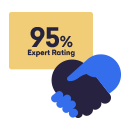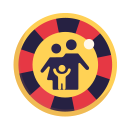Responsible gambling: Advice, help, safety
Our goal is to serve up the best possible player experience. Responsible gambling is a huge part of that.
At Time2play, we pride ourselves on being a transparent brand you can trust, and we’ve implemented a whole host of initiatives to transform that vision into reality.
From an optimized scoring system to a player-centric community, here are the top things we’re doing to promote responsible gambling on our platform and the industry at large.
How we support responsible gambling

Transparent ratings from real experts
We use the same criteria to rate online gambling sites — everyone gets the same test, and we give numeric scores based on concrete, measurable benchmarks. Our rating criteria are publicly available, so you can see that we’re not just making up numbers.

Real, unedited player reviews
We encourage our readers to get involved. More voices = better quality, as far as we’re concerned. We want to hear from you, and we want you to tell us why you like/dislike each gambling site. It’s valuable to other players, and it’s useful for our own reviewing process too.

The Playscore — a marketwide view
We’re not afraid to put our cards on the table. Our Playscore crawls the web for as many reviews as it can find, and amalgamates them into one easy average score. We’ll tell you what we think about each gambling site, and we’ll show you what everyone else thinks too.

Labeled paid featured positions
We believe in full transparency with our readers. This is why on the occasions we accept paid featured positions, we mark them with a purple label to let you know this is a paid position. We also make sure that every paid featured position is valid — a site won’t get a featured position for PayPal casinos if it doesn’t offer PayPal transactions.

A real community
We think we’re pretty good at rating gambling sites, but we don’t want it to be just us. Leave your user review, and tell us about your own experience on the site. Hear from other players, learn from real people, support and advise each other. That’s how we win.

A comprehensive one-stop-shop
We’re aiming to expand to every major vertical of the global market, so our community, Playscores, and open systems will be available for whatever operator you want to get the dirt on.
Why we support responsible gambling
Betting is one of humanity’s oldest forms of fun, and we’ve all heard stories about lucky players who’ve done well for themselves. But the effects of problem gambling can be devastating, both to individuals and families.
Gambling has its dangers, but with help available and protections in place, they’re mitigated. We’re committed to doing our part there. Here are some of the reasons why we take a pro-player and pro-people stance in the online gambling industry:
We show sections highlighting these risks on many of our pages. Why? We’ve got a few reasons:
- We want you to remain safe and have the best gambling experience possible.
- We’re not afraid to address the downsides and risks associated with gambling.
- We want to demonstrate why responsible gambling is so important for the industry.
How can we gamble responsibly?
Responsible gambling can be defined as minimizing risks for individuals and society.
It involves a shared responsibility between:
- Individuals — to make informed choices, set limits, and seek help if needed.
- The industry — to promote responsible practices, prevent problem gambling, and protect vulnerable individuals.
- Governments and regulators — to provide clear information, fund support services, and raise awareness about the risks of gambling.
The most common initiatives in the USA are dedicated pages on gambling sites, guiding players to their responsible gambling tools and external help organizations.
These are often state-specific and legally required by a gambling site to get its license. You’ll usually see the seals as logos in the site’s footer — it’ll be the same logo on all legal sites in a given state.
Fair games are an important part of responsible gambling too. Casino sites need to have their games audited to make sure they pay out regularly and aren’t overwhelmingly favoring the house.
This sort of stuff is usually handled by each state’s gaming control board. In New Jersey, for example, it’s the Division of Gaming Enforcement and the Gaming Control Board in Pennsylvania.
While legal protections are in place, there are plenty of things we can do to drill into the safe side of things:
Gambling addiction — tips on spotting the signs
Problem gambling can be defined as gambling that disrupts your life, chasing losses despite negative consequences.
Even if you know about responsible gambling, spotting the signs of problem behavior isn’t always an easy task.
We’ve put together a list of tips that could help you flag the warning signs.

Stop cold turkey and see how you feel
Try to spend a few days without gambling. Is it harder than you thought it would be? Do you find yourself snappy and irritable at all? Are you thinking about gambling constantly? Do you want to gamble even during social events with friends and family?

Analyze your money trail
What part of your budget does your gambling money come from? Have you ever taken money from living, educational, or health-related expenses to fund your gambling? Have you ever borrowed money to gamble, or stolen it?

Think back over your losses
Have you ever ‘chased a loss’ — lost more than you wanted to then lost even more trying to win it back? Has a loss ever made you feel stressed and distraught? Have you ever lied about losses, especially to those closest to you?

Ask your friends and family
What does your family think about your gambling? Does it affect your relationships with them or your friends? Are you relying on them to fund your gambling?
The signs mentioned are heavily linked to gambling addiction. That being said, we’re not here to diagnose you. If these signs have aroused any concern, reach out to a professional.
Where to get help
If you’ve decided to reach out, you’ve got options. There are plenty of support organizations that provide help to those who want to control their gambling better.
You can reach us at [email protected] for more information.
National Council on Problem Gambling
The NCPG is a nationwide organization that’s been operating since 1972. It’s a huge promoter of programs and services which help individuals and families who have been affected by problem gambling. They can be contacted confidentially at any time of day via their website, phone at (202) 547-9204, or email at [email protected].
American Addiction Centres
Since opening in 2007, AAC has grown into America’s largest network of rehab facilities. It boasts a success rate of more than double the national average. They can be confidentially contacted 24/7 via freephone at (866) 269-5556.
800-Gambler
Officially called the Council on Compulsive Gambling of NJ, 800-Gambler is a 24/7 confidential helpline, recommended on the responsible gaming pages of most NJ gambling sites. Their 1-800-GAMBLER helpline is a confidential, free, 24/7 service that can be accessed by most of the US. You can also contact them through text or chat through their website, or use it to find a meeting.
Substance Abuse and Mental Health Services Administration
SAMHSA is a government site run by the US Department of Health and Human Services. Their website allows you to find treatment services near you and offers a national helpline at (800) 662-4357 that directs people to treatment and information services, 24 hours a day.
Gamblers Anonymous
Operating since 1957, Gamblers Anonymous is a community organization, describing itself as having only one membership requirement — a desire to stop gambling. It runs hotlines in every state, and has a web tool to help its users locate nearby meetings.
Responsible gambling tools
Self-help options are available beyond contacting support organizations. There are plenty of RG tools provided by operators or payment providers, or tools you can use for your personal use.
Preventing underage gambling
Underage gambling poses real dangers to minors and their families. Despite the legal age of 18 or 21 for most gambling forms, minors can potentially find ways to access online casinos, place bets, or even buy lottery tickets.
Our dedicated underage gambling page has detailed information on this issue and provides tips and advice on how to confront and prevent it.
Other vulnerable groups
Minors aren’t the only demographic disproportionately at risk from the dangers of gambling. We believe in the value of bringing attention to those who are most at risk, and highlighting their struggles. Together, we can provide knowledge and build a better, stronger, safer gambling environment for all.




